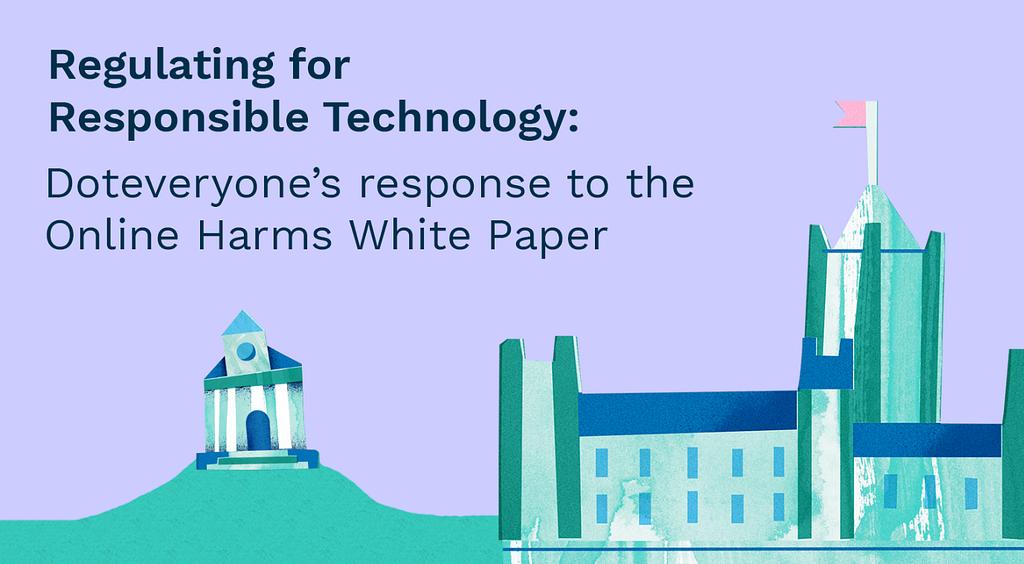Doteveryone’s response to the Online Harms White Paper
UK Government proposals for a new internet regulator need more work to deliver the systemic change promised

The UK Government’s Online Harms White Paper promises a new system of accountability and oversight for tech companies. The ambition is welcome. But at the moment, the proposals themselves fall short.
The White Paper sets out plans for an independent regulator with enforcement powers that will oversee a duty of care on companies to safeguard their users from harmful content and behaviours.
But the positive intent to ‘address a comprehensive spectrum of online harms in a single and coherent way’ is not what the White Paper turns out to be. Instead, it’s a hodge-podge of Codes of Practice and initiatives with neither a clear articulation of what problem the proposals are supposed to solve, nor a clear vision for what alternative future they’re intended to promote.
There’s a lot of work to be done to make this the world-leading piece of legislation that’s promised. Doteveryone’s full response to the government consultation on these plans is available here and our earlier briefing paper on the duty of care is here.
Some in industry are using the White Paper’s shortcomings as a pretext to argue that regulation isn’t possible. But Doteveryone and many other civil society organisations see an opportunity to build these proposals into a forward-looking framework that can support a fair, inclusive and thriving democratic society in the digital age.
It’s positive that the government has promised to take the consultation feedback on board and we look forward to continuing these conversations.
Our full consultation response looks at specific issues but here are the broader areas we think government should address in developing its proposals further:
- Create an overarching and co-ordinated vision for regulation. The Online Harms White Paper sits alongside a proliferation of overlapping initiatives including the forthcoming Consumer Markets White Paper, ICO’s age-appropriate design-code, and the Furman Review into digital competition. Without a clear, unifying narrative these are almost impossible to navigate and often in potential conflict. Last year, Doteveryone published recommendations for an Office for Responsible Technology to sit above the regulatory landscape and create coherence.
- Develop a comprehensive innovation strategy that promotes the UK as a world leader in responsible technology. Regulation will not work alone. The government must offer carrots and not just sticks. Our research found that one in twenty (5%) of UK tech workers and one in six (16%) of people in AI have left a job due to concerns about the consequences of their products.This poses a significant talent and retention issue for the UK industry. We recommend a coordinated system of incentives for responsible innovation so that government offers carrots and not just sticks.
- Ensure the new regulator protects fundamental rights alongside harm prevention and be honest about the challenges this poses. The regulator will arbitrate on novel and highly contentious issues that sit at the heart of the public’s democratic rights; it must be open to public, civil society and industry engagement, but its independence must be unimpeachable. We recommend the regulator uses the established UN human rights framework to set out public interest objectives for online services to meet.
- Take a systemic approach, The regulator must focus on promoting safety and responsibility by design. All online harms to individuals or society should be within scope of a duty of care, including consumer detriment and economic harms. The codes of practice in the White Paper, as currently drafted, undermine the duty of care principle and draw the emphasis towards after-the-fact take down of content, penalties and enforcement actions. These should be a last resort, not core regulatory activities.
- Be forward-looking and anticipatory. Digital technologies move too fast for reactive and retrospective regulation to be effective. The regulator will need to embrace the approaches set out in the Department for Business, Energy and Industrial Strategy’s Regulating for the Fourth Industrial Revolution White Paper and emulate forward-looking regulators such as the Financial Conduct Authority. An effective risk-based approach will also depend on developing a more rigorous evidence-base around online harms.
- Demonstrate tangible change in the public’s experience of online services. The role of the regulator is not just to provide technocratic fixes. The regulator must prioritise practical interventions and engage with the public to understand their concerns and communicate the remedies so that people recognise a perceptible rebalancing of power between tech companies and the public.
Read our full White Paper response here.
Read our briefing paper on a digital duty of care here.
Doteveryone’s response to the Online Harms White Paper was originally published in Doteveryone on Medium, where people are continuing the conversation by highlighting and responding to this story.